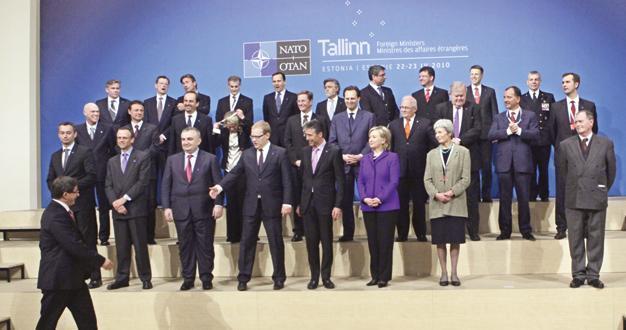Turkey calls for NATO meeting to discuss security threats
ANKARA

Turkey’s then Minister of Foreign Affairs Ahmet Davutoglu (L) arrives for a family photo with delegates during the informal meeting of NATO Foreign Ministers in Tallinn April 22, 2010.
Turkey has called for a meeting of its NATO allies to discuss threats to its security and its airstrikes targeting the Islamic State of Iraq and the Levant (ISIL) in Syria and the outlawed Kurdistan Workers’ Party (PKK) in Iraq, as Turkey boosts international efforts to gain support for the strikes.NATO’s secretary general said Ankara has not yet asked for any military support.
The move came as Turkish F-16 jets again took off from the southeastern province of Diyarbakır to attack PKK targets across the border in northern Iraq.
NATO announced that its decision-making body, the North Atlantic Council, will convene July 28 after Ankara invoked the alliance’s Article 4, which allows member states to request a meeting if they feel their territorial integrity or security is under threat.
The Turkish Foreign Ministry said Turkey would inform allies about the airstrikes which followed an ISIL suicide bombing near Turkey’s border with Syria that left 31 people and the attacker dead, as well as an ISIL attack on Turkish forces, which killed a soldier.
Turkey requested the meeting, which includes ambassadors of all 28 member countries, “in view of the seriousness of the situation after the heinous terrorist attacks in recent days,” NATO said.
NATO itself is not involved in operations against ISIL, although many of its members are. As an alliance, however, NATO is committed to helping defend Turkey.
Turkey has simultaneously bombed ISIL positions near its border with Syria and the PKK in northern Iraq. It has also carried out widespread police operations against suspected PKK and ISIL militants and other outlawed groups inside Turkey. Hundreds of people have been detained, although the operations have largely targeted Kurds and leftists rather than jihadists.
Tensions flared with the PKK following an ISIL suicide bombing on July 20 that killed 31, as Kurdish groups blamed the government for not doing enough to prevent ISIL operations. On July 22, PKK claimed responsibility for the killing of two policemen in the southeastern province of Şanlıurfa.
The PKK has said Turkey’s airstrikes could spell the end of a cease-fire announced in 2013.
Germany’s government said Chancellor Angela Merkel spoke by phone on July 22 with Turkish Prime Minister Ahmet Davutoğlu and assured him of “Germany’s solidarity and support in the fight against terrorism.”
She also “appealed not to give up the peace process with the Kurds, but to stick to it despite all the difficulties,” a government statement said.
A statement from Davutoğlu’s office said the Turkish leader told Merkel that Turkey would take all measures needed to fight terrorism and would resume cross-border raids when deemed necessary while continuing “to take steps toward a [Kurdish] settlement and democratization.”
Foreign Minister Mevlüt Çavuşoğlu also discussed the issue with his German counterpart, Frank-Walter Steinmeier, late on July 26.
The White House said Turkey has the right to defend itself against attacks by Kurdish rebels. Spokesman Alistair Baskey strongly condemned recent attacks by the PKK, which the U.S. has designated a terrorist group, and said the PKK should renounce terrorism and resume talks with Turkey’s government.
But Baskey also said both sides should avoid violence and pursue de-escalation.
Davutoğlu also conducted phone conversations with United Nations Secretary-General Ban Ki-moon and European Council President Jean-Claude Juncker on July 26 and discussed the Turkish military’s strikes.
Turkey has not asked for substantial military help from NATO in its campaign against ISIL and the PKK, said Jens Stoltenberg, the NATO chief on July 27, a day before the organization meets to discuss the fighting.
Stoltenberg warned Turkey that its bombing campaign could endanger the progress that has been made in recent years toward reaching a peace deal with the PKK.
“Turkey has a very strong army and very strong security forces. So there has been no request for any substantial NATO military support,” Stoltenberg said in an interview with the BBC.
While applauding Ankara for joining the fight against the ISIL, the NATO chief cautioned that “self-defense has to be proportionate.”
Ankara informs world leaders
President Recep Tayyip Erdoğan held several phone conversations with Russian President Vladimir Putin and Iraqi President Fuad Masum on July 26 and informed them about recent cross-border military operations against the PKK in northern Iraq and ISIL positions in Syria.
Putin and Masum conveyed condolences to the families of the Turkish victims killed in recent terror attacks, according to presidential sources quoted by Anadolu Agency.
















